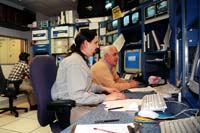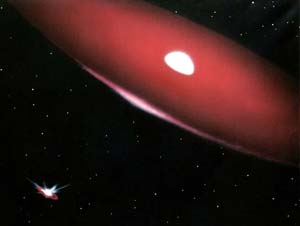
Just as matter can be converted into energy, so too can energy become matter. That’s what five-dozen Jefferson Lab researchers were counting on for an experiment in Hall A
Albert Einstein figured it out by 1905, as he was formulating his special theory of relativity: while you can’t exactly get something from nothing, you can come close. His famous formula, E=MC 2 , works both ways. Just as matter can be converted into energy, so too can energy become matter.
That’s

Models of Larch budmoth outbreaks in the European Alps may eventually show scientists how to model a variety of disease and insect eruptions that rely on a combination of enemy, host and spatial movement to decimate populations, according to a team of ecologists.
“We use theoretical models to help understand the spatial component in these outbreaks and to predict how spatial spread occurs,” says Dr. Ottar N. Bjornstad, assistant professor of entomology and biology at Penn State. “With local

Nitric oxide is a natural part of the body’s immune defense. Linköping University researcher Thomas Schön has studied this compound in connection with the skin disease leprosy and the lung disease tuberculosis. The Swedish researcher has found that nitric oxide probably contributes to the disease in the case of leprosy but, on the other hand, plays a positive role in protecting against tuberculosis. This role can be reinforced by adding a supplement of arginine, which is found in peanuts, for example

Astronomers have been puzzled for decades as to how the rings of hot gas surrounding certain types of star are formed. Now a team of scientists from the Universities of Glasgow and Wisconsin believe they have found the answer. The team studied a type of young, hot star, known as a “Be star”, that has a disk of glowing gas around it, similar to the rings surrounding Saturn. Until now, no one has been able to account for how these rings form but in a paper published this month*, the team suggest an ans

Using a technique based on the work of the 1902 Nobel Prizewinner, Pieter Zeeman, an international team of astronomers have, for the first time, provided conclusive proof that the magnetic field close to a number of aging stars is 10 to 100 times stronger than that of our own Sun. These observations suggest a solution to the long outstanding problem as to how, at the end of their lives, a perfectly spherical star can give rise to the complex and often far from spherical structure seen in the resultin

VLT UVES Observes Most Metal-Deficient Star Known [1]
A faint star in the southern Milky Way, designated HE 0107-5240, has been found to consist virtually only of hydrogen and helium. It has the lowest abundance of heavier elements ever observed, only 1/200,000 of that of the Sun – 20 times less than the previous record-holding star.
This is the result of a major ongoing research project by an international team of astronomers [2] . It is based on a decade-lon

– new calculation confirms standard model of particle physics. Contribution of hadronic vacuum polarization determined with unprecedented accuracy. The magnetic moment of the muon is an important precision parameter for…
Technique may prevent formation of unwanted waves that siphon off needed energy. Heating plasma to the ultra-high temperatures needed for fusion reactions requires more than turning the dial on a…

An international team of astronomers, led by researchers from the Astronomical Observatory of the University of Warsaw, have identified a new class of cosmic X-ray sources. The findings have been…

How deubiquitinases USP53 and USP54 cleave long polyubiquitin chains and how the former is linked to liver disease in children. Deubiquitinases (DUBs) are enzymes used by cells to trim protein…

Conceptual blueprint to analyze experimental catalyst data. Machine learning (ML) models have recently become popular in the field of heterogeneous catalyst design. The inherent complexity of the interactions between catalyst…

Antibody that Neutralizes Inhibitory Factors Involved in Nerve Regeneration Leads to Enhanced Motor Function after Acute Spinal Cord Injury. Researchers at 13 clinics in Germany, Switzerland, the Czech Republic and…

How simulations help manufacturing of modern displays. Modern materials must be recyclable and sustainable. Consumer electronics is no exception, with organic light-emitting diodes (OLEDs) taking over modern televisions and portable…

“Neurons that fire together, wire together” describes the neural plasticity seen in human brains, but neurons grown in a dish don’t seem to follow these rules. Neurons that are cultured…

The quest for sustainable energy solutions has been a major focus of scientific research for decades. Solar energy, a clean and renewable source, has emerged as a promising alternative to…

With a processing speed a billion times faster than nature, chip-based laser neuron could help advance AI tasks such as pattern recognition and sequence prediction. Researchers have developed a laser-based…

New technology could remotely identify various types of plastics, offering a valuable tool for future monitoring and analysis of oceanic plastic pollution. Researchers have developed a new hyperspectral Raman imaging…

Artificial Intelligence (AI) has established a strong presence across industries, large and small. The “VoBaKI” research project has empowered small and medium-sized enterprises (SMEs) with an innovative tool to independently…